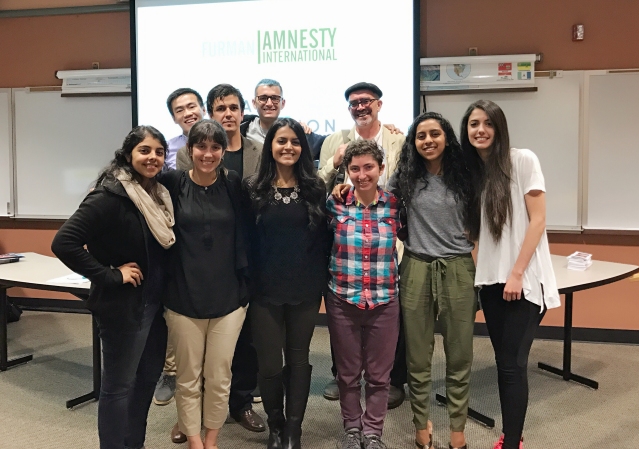At the end of 2015 there were 21.3 million registered refugees worldwide, according to the U.N. high commissioner for refugees. Almost five million of these refugees came from Syria, alone.
Ten Furman organizations tried to make this reality more concrete for both students and Greenville community members through a Cultural Life Program (CLP) series entitled “The Refugee Crisis: Local and Global Responses,” from Oct. 26 to Nov. 7.

The events ranged from an overview of the Syrian refugee crisis to religious perspectives on the global refugee situation to events featuring Furman students who have worked with refugees in camps and in resettlement agencies. The final event in the five part series, “How to Welcome Refugees,” featured Farahnaz Afaq, a Wofford student and refugee, and Jenna Barnett, a Furman alum who works for a refugee resettlement agency.
“I’ve learned over the last couple of years that if you want to have an impact on the campus one event is not enough. People go and forget about it afterwards,” said Dr. Alfons Teipen, the chair of the Middle East and Islamic Studies minor and a leader on the planning committee.
The planning committee was composed of students, faculty and staff from different clubs and academic departments across campus. The different groups represented human rights interests through Amnesty International and religious perspectives through the Department of Religion, the Chaplain’s Office, Muslim Student Association and the Jewish Student Association. Other groups that sponsored the series included the Departments of History, Sociology and Political Science, the interdisciplinary Middle East and Islamic Studies minor and the Student Diversity Council. Funding for the series was supplemented by the Kendrick-Poerschke Fund and the A.J. Head Fund.
Members of the planning committee wanted the series to occur before the presidential election on Nov. 8 in light of the rhetoric concerning refugees and immigrants during the campaign cycle.
Teipen, an immigrant himself, explained his own experience moving from Germany to the U.S.
“Wherever I went I was welcomed with open arms and there was no talk about immigrants as a problem,” he said. “The recognition was that immigrants can contribute in very significant and useful ways to society and so I’m just aghast at recent rhetoric.”
Student members of the planning committee were pleased with the results of the series. Prospective audience members had to be turned away from the first discussion on Oct. 26 because the room was full and the four events that followed also had large turnouts.
Daniel Zhang, a senior and the president of Amnesty International, hoped that the series educated and inspired students.
“I realized at the first event, a lot of people don’t know about this issue. Or they might know but not know about the seriousness of it,” Zhang said. “Our message was: This matters. You should help them. Here’s how to help them.”
A brochure with website information for local, national and international aid organizations was distributed at each event.
“One of our goals was to not only make people aware, but to get them involved,” said Sarra Souid, president of the Muslim Student Association. She thinks the CLP series accomplished this goal.
“Even after the last event had ended we had students coming up to us asking questions,” she said.
Souid enjoyed the last events in the series the most because they featured Furman students who have advocated for refugees either during their time at Furman or after graduation. Students asked how they could help. Audience members saw that they could work for solutions to the global refugee crisis too.